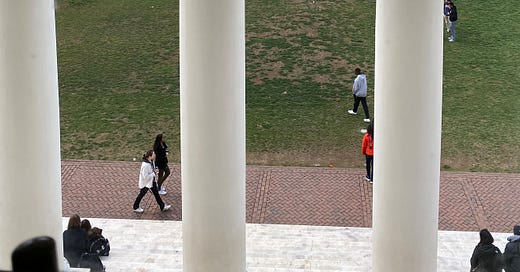25 years ago at the end of this month, Steve and I exchanged rings and vows in a little church in Tenafly, NJ. That day, we were joined in hearts and souls and student loans debt. Together, we combined my $30K of loans with his $45K, and we started our new lives together with a $75,000 shackle around our ankles.
How did we accumulate all that debt? Well, both of us had some debt from undergrad years. Then, we both got terminal MAs; mine was in social science at the University of Chicago, his masters degree was in history at Cleveland State University. Back then, people were still getting masters degrees in the humanities, just because nobody told them it was a bad idea.
Then, we got our PhDs at a university that did not fully fund its students. On top of a full course load, we taught classes all over the city for the city university system earning less than minimum wage. I also had a part-time job in semi-exploitive policy center at the university. Even with all that hassle, there was no way that we could pay for our slum apartments and tuition without loans. We just signed the paperwork and got the checks.
Eventually, with some financial help from my parents, we quit all our little jobs and finished our dissertations in one crunch year in 2000. By that time, we also had a baby. And then we came to very awful realization that there were no openings even in remote colleges for historians, like Steve, with an expertise in Nazis. I might be able to find a job with my speciality, but we would have to move across the country.
So, we were just getting into the job market for the first time in our early to mid-30s. We missed ten years of accumulating job experience and retirement savings. We were $75,000 in debt. And the few jobs that existed in academia were reserved for PhDs who graduated from Ivy League programs. Holy shit!
When we expressed outrage at this situation to other academics, they told us that that we should never have gone to a grad school that didn’t fund its students. We made bad choices, they said with a shrug.
But our graduate institution certainly knew that they were preparing students for jobs that didn’t exist. Why did they continue to operate such a pointless program? The faculty loved teaching grad students, rather than over-flowing introductory classes with unprepared freshman. There was no incentive to shutdown a university program that made the faculty happy and brought in tuition money from gullible grad students.
It took us 20 years to pay off those loans. And now my oldest son has his own student loan debt from his excessively long stay (sigh) at his undergraduate college. Given this history, you would think that I would be more enthusiastic about Biden’s proposal to erase student loan debt for most borrowers. Instead, my reaction is a big “meh.”
Cancelling the debt will not solve the problem that colleges are, in some cases, operating as degree-mills without any clear benefits for the degree recipients. Yes, buyer beware and all that, but colleges should be respected institutions in our country, not elaborate scams. A bachelors’ degree from a selective college (with most majors) is clearly worth the investment. However, that degree can be obtained at a less expensive public college with moderate student loan debt.
Six figures of debt from a private college is a huge mistake. Just as a PhD from a less prestigious graduate program is a huge mistake. Pretty much any master’s degree is a mistake. Eliminating student loan debt will not stop universities from running these schemes.
What should be doing instead? First, Students should have caps on the amount of student loan money they can borrow. They should have $40K limits, unless they attend a medical, law, or business school. I have friends who left my less-than-awesome graduate school program with six figures of loans; I can’t imagine that they have paid off that debt with their positions at community college and non-profit groups.
Second, we should be bolstering our community college system and building new career training programs. Reforms in this area would benefit students that need the most help.
Third, we should make sure that colleges offer affordable programs that have a clear return on investment. They should fund students, who cannot afford full tuition. They should make sure that their students finish their programs and in a timely manner. Colleges that cannot operate in this manner should be closed.
Fourth, for the unfortunate people who got suckered into taking out all those loans, they should be able to to dissolve the debt with bankruptcy.
Rather than simply forgive debt, we must repair the whole system. Cancelling student loan debt, which might be kind for those currently in trouble, allows the engine for the debt to keep on creating more debtors.
LINKS
On the blog, we talked about the new apartments around New York City, and our first apartments.
Happy spring pictures of my house.
The topic du jour is clearly the leaked Alito opinion draft, which makes the case for over-turning abortion.
Hannah at Ballerina Farm showed a video of her birth of her latest kid. Check it out. I showed it to Ian, because we realized only last month that he had no sex education in high school. Our therapist and I are teaching him all this stuff. So, thanks, Hannah!
2/3rds of undergraduate certificate programs left their students worse off than the typical high school graduate, making an average of less than $25,000 per year.” Many certificates don’t pay off, but colleges want to keep them.




Watching: Finished Yellowstone (love), finished Outlander (meh), finishing Moon Knight (good), Russian Doll
PICTURE: Bought a set of about 100 leather bound books this weekend. Now, I’m conditioning all that leather.




